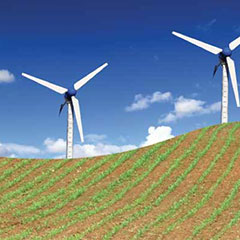While Germany and Scotland grab most of the headlines for wind energy production, it is Denmark that sets the standard in policy terms. Copenhagen is preparing a push for stronger EU-wide 2030 climate and energy goals despite tough opposition from states such as the UK and Poland…
The Danish climate and energy minister, Martin Lidegaard, has said he was “very, very satisfied” that the EU climate and energy package announced in Brussels recently had got Europe’s states to pledge a 40% cut in greenhouse gas emissions by 2030, as measured against 1990 levels.
But the goal of sourcing 27% of the bloc’s energy from renewables by 2030 is only binding at EU-level, leaving individual states to go their own way, and raising questions of how Brussels will pull them back if they stray too far.
“I actually think that what came out [of the European Commission] was too compromised,” Lidegaard said from the World Economic Forum in Davos. “We were happy that we got a binding target. We just want to ensure that it will actually be binding and we would like a more ambitious level.”
It is understood that Denmark is also likely to seek stronger language on energy efficiency targets – which the package only mentioned in the vaguest terms – ahead of an EU leaders’ summit.
The UK won an opt-out of binding renewables targets at national level in the package. But this was merely “the suggestion of a compromise, and it will of course have to be negotiated in the weeks and months to come,” Lidegaard said.
“It’s going to be a pretty tough debate but we are ready from the Danish side and we expect to put a formal Danish position on the table within weeks,” he added.
Denmark is one of the EU’s cleanest energy providers and has what it calls “the most ambitious energy plan in the world” to use renewable sources for half of its electricity needs by 2020, and for all of its energy and transport needs by 2050.
Because of this, Copenhagen views advance knowledge of how the continent’s renewable capacity will change as a “precondition” to cost-effective decarbonisation. Grid expansion, market integration and capacity factors all need to be planned for, officials say.
In a last ditch bid to shore up support for a binding renewables goal, the Danish prime minister, Helle Thorning-Schmidt, called European Commission President JosÈ Manuel Barroso the night before the decision was taken, according to Lidegaard.
The new German energy minister, Sigmar Gabriel, was especially “proactive” in pushing for a binding 27% renewable target, Lidegaard said, while like-minded countries such as Ireland, France and Italy also had an impact.
In Lidegaard’s view, it was “too early to say” whether Poland would veto some areas of the package, which it has been hostile to, at the European Council level.
“We will have a rather hard political debate about this because we have very different points of view,” he said. But only a “few” member states wanted the EU to wait until after 2015 before setting new climate targets, Lidegaard added.
Across Brussels, one view spanning the gamut, from environmentalists to industry, sees a British hand behind the pen that inked last week’s 2030 climate and energy package – and behind that, an increasingly Eurosceptic population.
The UK, which had not previously been very influential in EU climate politics, this time won positions for: a 40% greenhouse gas emissions target; no binding national renewable target, no efficiency goals, no binding shale gas law, and an end to the Fuel Quality Directive.
“If there’s one person to blame for the lack of a renewables target, it is [UK Prime Minister] David Cameron,” a senior source in energy intensive industry commented. “If he’d said the UK wanted a renewables target the balance of power might have shifted.”
“Britain is faced with citizens that don’t want the EU to tell them what to do and have a high scepticism arising from high energy prices,” the official continued. “Its position coincided with a general mood. The social consensus of 2007 [when the first climate package was signed] just isn’t there anymore.”
National competence
Britain argues that energy is a recognised national competence and that binding renewable targets could interfere with its plans to lower emissions with shale gas, nuclear energy and carbon capture and storage programmes.
Its position is thought to be supported by Poland, Spain and a sprinkling of Eastern European countries.
But environmentalists are sceptical that the UK’s agenda will enable it to decarbonise, and fear the consequences of accommodating it within Europe’s climate and energy policy.
Shortly before the package was announced, the Green MEP Claude Turmes accused President Barroso and his secretary-general, Catherine Day, of “manipulating in order to please the British,” and so advance his future career prospects.
Lidegaard would only say that London had played a “very strong role in gathering a green growth group to promote the idea of an ambitious CO2 target”.
The world’s “most ambitious energy plan”
As the smoke cleared from the European Commission rooms where the 2030 climate and energy package had been discussed, Martin Lidegaard explained that the really tough debate was only just beginning.
The 2030 climate and energy package depends on countries such as Denmark over-achieving on renewables deployment, while others like Poland and the UK underachieve. Do you think that’s a sustainable way to decarbonise – and is it even fair?
Denmark has no problem pursuing our present path towards a complete fossil fuel-free society and we are going to do that no matter what. But of course we have, in the weeks and months to come, to really discuss in depth how exactly that new binding model for the EU as such – and not put on every member state – how we can roll that out in a fair way. And in a way that ensures that we can actually achieve our binding target. We have to explore that further in the weeks and months to come and that’s one of the things that we’re going to do very carefully in the Danish government.
Ok, but there are no binding targets on member states, so if the bloc as a whole goes off track towards meeting the 27% goal, do you really think the same member states that are lagging behind will vote to make the target binding on themselves, and make their lives more difficult? Can you see Britain or Poland doing that?
I hope that even those states that have been sceptical of binding targets for each member state will see the benefit of having a common binding target, simply because if you want to plan a cost-efficient, cheap deployment of renewables in the EU, it is a precondition that we know how much renewables we are going to integrate into the European energy system. It takes a number to plan the grid expansion. We need an integrated market with the capacity required to ensure that we can get an efficient deployment of renewables. If we are not going to plan our capacity it will be more expensive than it needs to be. That is why we are so supportive of a binding target.
Do you think the package will go through the European Council easily?
President Barroso said that there would be a lot of opposition from member states who felt that it was going too far, too fast a time of recession. Do you think there could be a Polish veto on some areas?
It is too early to say. What I am pretty sure about is that we will have discussions. We will have a rather hard political debate about this because we have very different points of view.
Which will be the toughest areas?
Some member states would have preferred that the EU wait until after 2015 to make new targets for climate and renewables. They are few and I am very, very satisfied that the Commission has played out with a target for CO2 reductions which actually makes it possible and puts us on a path to our 2050 targets. I think that is a good starting point for the negotiations. It’s going to be a pretty tough debate but we are ready from the Danish side and we expect to put a formal Danish position on the table within the very weeks.
What role did the UK play in the renewables debate? Many in Brussels believe that it won everything that it wanted.
Well, the UK has played a very strong role in gathering a green growth group to promote the idea of an ambitious CO2 target. The UK can take a lot of credit for that. We had different opinions about a binding renewables target. I actually think that what came out [of the European Commission] was too compromised. We were happy that we got a binding target. We just want to ensure that it will actually be binding and we would like a more ambitious level, whereas the UK has ensured that we won’t get it for each and every member state. That was a compromise. Now, that is [actually] the suggestion of a compromise and it will of course have to be negotiated in the weeks and months to come as well.





























